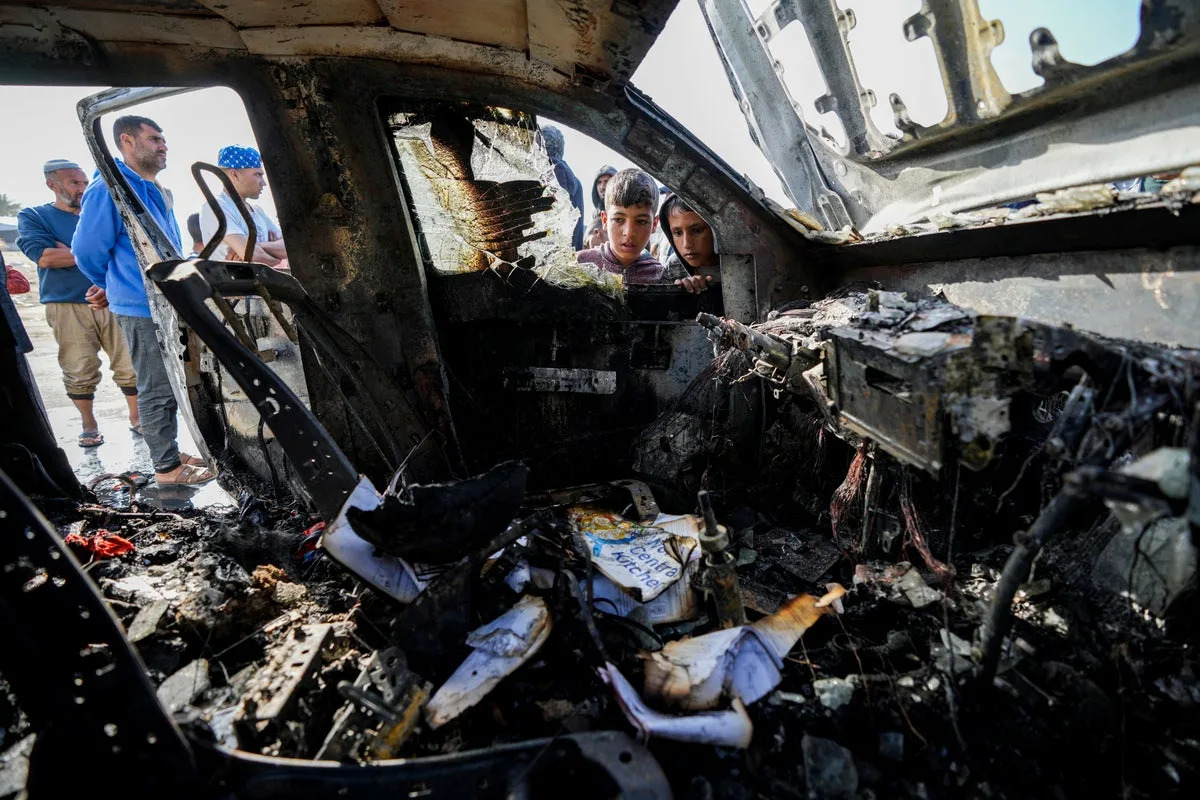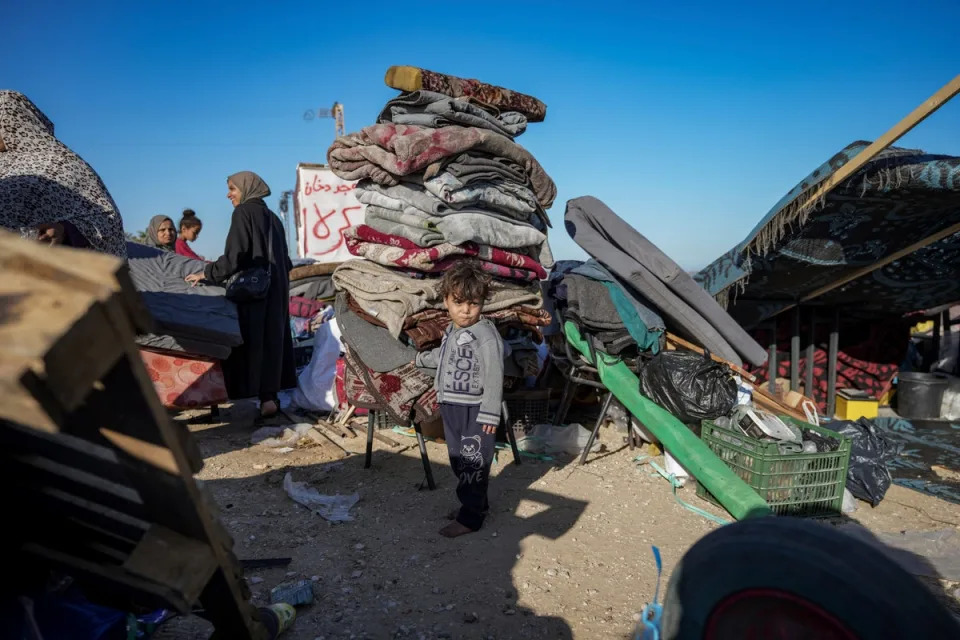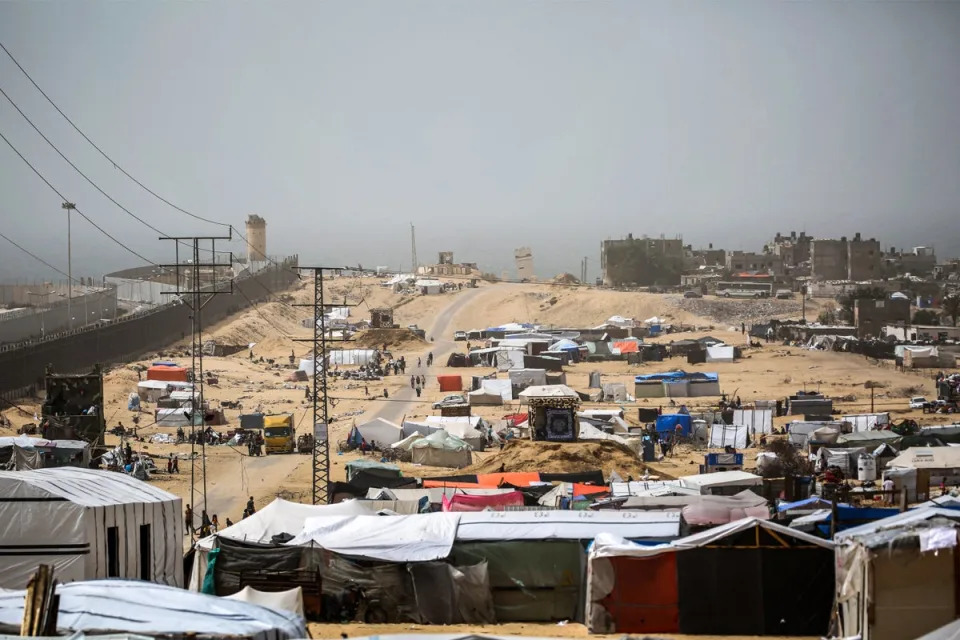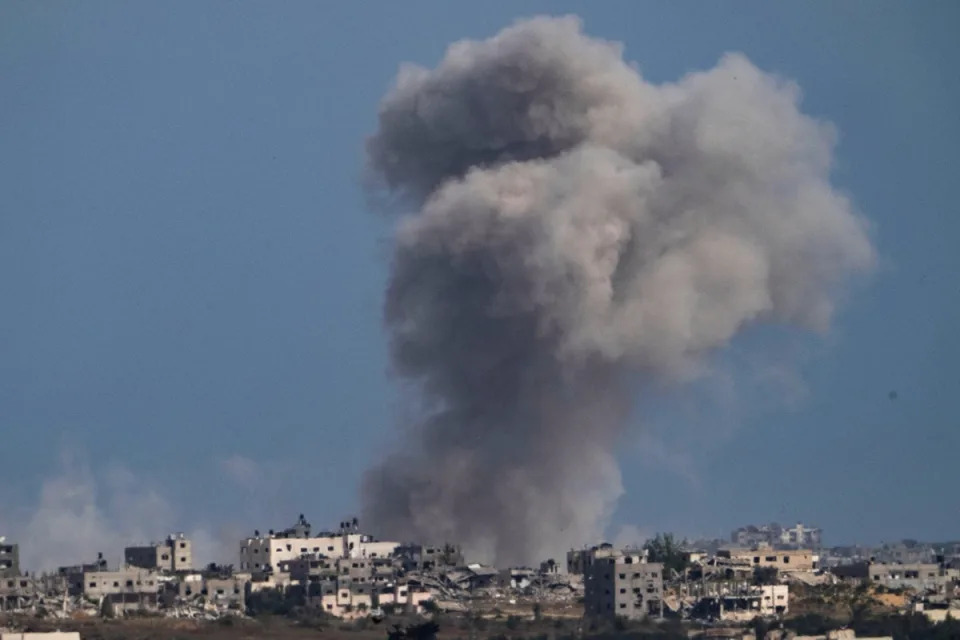Bel Trew
Thu, 16 May 2024

A destroyed World Central Kitchen vehicle in Gaza (AP)
Israeli forces have killed and injured dozens of humanitarian aid workers, including British citizens, in eight strikes on aid convoys and shelters whose coordinates were shared with Israel to ensure their protection, according to research by The Independent and a new investigation by Human Rights Watch (HRW).
Israel’s forces did not issue warnings before the strikes, which killed or injured at least 31 people including several children, HRW’s report alleges. The New York-based rights group identified eight different incidents in total, including the 1 April drone strike on a World Central Kitchen (WCK) convoy, which killed seven aid workers. It concluded that the eight strikes – which killed at least 15 people, including two children – were likely to have been unlawfully indiscriminate, or to have been carried out without sufficient precautions being taken to ensure that the target was military. The hits also had a massive impact on the distribution and coordination of aid – at a time when Gaza faces famine.
The report corroborated testimonies gathered by The Independent, which show that in several instances British doctors and aid workers were present and even killed or wounded by the strikes. The strikes have included naval shelling and drone strikes. At least one of them took place in a so-called humanitarian zone, al-Mawasi.
The Israeli military did not comment about the details of these specific incidents but said any incident involving humanitarian aid convoys, facilities or personnel “is being thoroughly examined” included those The Independent was investigating and those mentioned in the HRW report.
“According to the examination’s findings, lessons are learned and implemented in order to prevent reoccurrence of such incidents and if so required, command, disciplinary and other measures are taken against individuals responsible,” the military added.
It said: “The IDF has continuously worked throughout the war to allow and facilitate the entry and delivery of extensive humanitarian aid to the Gaza Strip, out of its commitment to international humanitarian law, and going even beyond. This is done partly by working in tight cooperation with aid agencies and organizations and with the international community” via a joint coordination cell.
However, heads of aid agencies and UN officials told The Independent that a coordination system that is supposed to protect aid workers is “clearly failing” and that there needs to be dramatic change.
HRW said that the “pattern of attacks despite proper notification of Israeli authorities” raises serious questions about Israel’s commitment to, and its capacity for, compliance with international humanitarian law. It concluded that Israel’s allies, such as the US and the UK – whose weapons were apparently used in the attacks the organisation documented – should suspend military assurances and arms sales to Israel.
“Israel’s killing of seven World Central Kitchen aid workers was shocking and should never have happened under international law,” said Belkis Wille, associate director of the Crisis, Conflict and Arms division at HRW. “Israel’s allies need to recognise that these attacks that have killed aid workers have happened over and over again, and they need to stop.”

Palestinians inspect a vehicle used by World Central Kitchen that was damaged in an airstrike in Deir al-Balah in April (AP)
Jan Egeland, the head of the Norwegian Refugee Council, told The Independent that, in total, more than 250 aid workers have been killed since October, “which we have never seen before”. He added: “It’s a world record ... Gaza is the most dangerous place for human for aid workers in recent memory.”
Tess Ingram, from the United Nations child agency Unicef, who was herself part of a UN convoy carrying aid to northern Gaza that was coordinated with the military but came under fire, said the system of deconfliction is “clearly failing”.
“What happened to WCK was tragic, but it’s not an isolated incident. We need to know that when we get a safety assurance for a mission, it will be facilitated, that it will be safe, and that we can trust those safety assurances. At the moment, it’s clear that the coordination system is not being respected.”
Israel launched its heaviest ever bombardment of Gaza, plus a ground assault and a blockade, in retaliation for a bloody attack by Hamas on 7 October during which around 1,200 people were killed and another 250 were taken hostage, including toddlers.
Since then, Palestinian health workers in the Hamas-run territory say Israel’s bombardment has killed at least 35,000 Palestinians, the majority of whom were women and children. Among the dead are more than 220 aid workers, including 190 UN personnel.
Most recently, this week saw the the first death of a foreign UN security staff member, who was killed on Monday (13 May) when a UN-marked vehicle travelling to the European hospital in Rafah was struck, a spokesperson said. Separately, the UN’s Palestinian refugee agency, UNRWA, reported that another of its staff members, a 53-year-old senior projects officer, was killed on Sunday after leaving Rafah, in an Israeli strike on the central town of Deir al-Balah.

Displaced Palestinians arrive in Deir al-Balah in central Gaza after fleeing from the southern city of Rafah (AP)
UNRWA officials told The Independent that they had registered 349 incidents affecting their premises and the internationally displaced people (IDPs) sheltering in and around them. They said these incidents had resulted in the killing of at least 408 IDPs (including at least 15 children and seven UNRWA staff). They said strikes from both sides had affected 30 UNRWA health centres, seven warehouses, six aid distribution centres, and 261 of their schools.
While facts surrounding many incidents remain subject to verification, UNRWA said the information so far available indicates that the “vast majority of incidents” were due to attacks and actions undertaken by Israeli forces.
These attacks are having a chilling effect on efforts to provide lifesaving aid in Gaza.
HRW said it has identified eight attacks that took place between 18 November and 1 April. These include an attack on a Medecins Sans Frontieres (MSF) convoy along with a guest house and a shelter; attacks on two UNRWA convoys and an associated guest house; an attack on a shelter belonging to the International Rescue Committee and Medical Aid for Palestinians (MAP); and an attack on a home sheltering an employee of the aid group ANERA.
The Independent has separately interviewed staff and witnesses, who corroborated the findings in the HRW report.
On 18 January 18, Aseel Baidoun of MAP told The Independent that the Israeli military had hit a residential compound housing the charity’s emergency medical team (EMT) and members of MAP’s local team and their family members in al-Mawasi – the alleged “safe zone” – despite the compound’s coordinates having been submitted to the deconfliction process. MAP said British government personnel had also confirmed on 22 December that the compound was registered as a “sensitive site”. Since then, an independent assessment by the UN has concluded that the damage was the result of an airstrike, most likely involving a weapon only owned by the Israeli military.

Tent encampments housing displaced Palestinians in Rafah, in the southern Gaza Strip, by the border fence with Egypt (AFP via Getty)
The attack injured several team members, caused significant damage to the building, and required the withdrawal of the six international members from Gaza, forcing the organisation to suspend lifesaving medical work at Nasser Hospital in Khan Younis.
Ms Baidoun said that since the attack, Israel had provided six different explanations as to why the airstrike took place, including that the Israeli military was unaware of what had happened; denying involvement; accepting responsibility for the strike but asserting that it was a mistake caused by a defective tail fin on the missile that was fired; and blaming the hit on a piece of aircraft fuselage.
“The variety of responses highlights a continued lack of transparency regarding what occurred,” she said. “It is clear from this experience that the Israeli military and government are either unable or unwilling to properly investigate this serious incident.”
She said the UK and the US, as current suppliers of arms and munitions to Israel, “have a particular responsibility to hold Israel accountable for this and other attacks on aid workers and civilians”.
UNRWA officials told The Independent that three of their aid convoys had been hit by Israeli fire – including in a 5 February incident in which naval gunfire punched a hole in a UNRWA aid truck that was flanked by marked UN vehicles. The vehicles were waiting at a previously agreed holding point for permission to proceed north.
“The three incidents involved UNRWA personnel on the way in or out of the north of Gaza. Twice was Israeli gunfire; the third incident in February was [carried out] by the Israeli navy,” said Juliette Toma, UNRWA’s director of communications.
Every time there is a convoy, the GPS coordinates of the routes are shared, as are the names and nationalities of the members, the contents of the convoy, the vehicle details, and their estimated arrival and departure time, Ms Toma said. The convoy is also in constant communication with the Israeli army, she added.

Smoke rises following Israeli airstrikes in the Gaza Strip (AP)
The Israeli military has yet to reply to a request for comment about the attacks on UNRWA, though it has told CNN that it is looking into the 5 February incident.
HRW also documented an attack on 20 February on an MSF guest house in the al-Mawasi neighbourhood, which has been identified as a humanitarian zone by Israel. The coordinates had been shared with the Israeli authorities. HRW concluded that an Israeli tank had fired a medium to large-calibre weapon at the multistorey apartment building housing 64 people, all of whom were MSF staff and their families.
The attack killed two people and injured seven others. MSF alleged that the weapon was an Israeli tank shell. It said its staff had seen no military objects in the area at the time and received no warning.
The ANERA aid organisation alleged that an Israeli strike hit the building in al-Zuwaida where Mousa Shawwa, their supply and logistics coordinator, was sheltering, despite its coordinates having been shared with the military.
“We did not receive any warning from the Israelis before the attack,” Mr Shawwa’s wife Doaa told HRW. “This is the thing that upsets me the most. My husband works for an American organisation and the Israelis knew we were there. They should have sent us a message to warn us to get out. Why didn’t they?”
Ms Ingram, from Unicef, said she was involved in an aid convoy, coordinated with the Israeli military, that was heading north on 11 April. They were asked to pull into a holding area at the Wadi Gaza checkpoint in the centre of the besieged strip, where they came under gunfire from the direction of the Israeli checkpoint.
Ms Ingram said three bullets hit her car: one hit the side window, one hit the door, and the third hit the bonnet of the car. She survived as she was in an armoured vehicle.
In the end they had to turn the convoy round.
“We have only had five missions to the north of Gaza this year as Unicef, which is nowhere near enough, and they weren’t large convoys,” she said. “There’s an ongoing problem with the number of coordinated missions that are being facilitated, let alone the dangers and delays faced on missions that are facilitated.”
The Independent reached out to the Israeli military for comment about this incident. The military said that “after an operational examination by the commanders, it appears that the IDF forces who were closest to the area were not within firing range of the convoy at the time and place indicated, and it was found that no fire was carried out at the vehicle by the IDF forces as described in the question”.
HRW has said that governments – including that of the UK – who continue to provide arms to the Israeli government risk complicity in potential war crimes. It urged them to instead use their leverage, including through targeted sanctions, to press Israeli authorities to cease such strikes and enable the provision of humanitarian aid and basic services in Gaza.
“On one hand, Israel is blocking access to critical lifesaving humanitarian provisions, and on the other, attacking convoys that are delivering some of the small amount that they are allowing in,” Ms Wille said. “Israeli forces should immediately end their attacks on aid organisations, and there should be accountability.”
Family pay tribute to ‘larger than life’ aid worker killed in Israeli air strike
Harry Stedman, PA
Fri, 17 May 2024

The family of a British man killed in an Israeli air strike in Gaza have paid tribute to his “larger than life presence” and his “legacy”.
James ‘Jim’ Henderson, 33, was among seven World Central Kitchen (WCK) workers who died when their convoy was hit outside the Deir al-Balah warehouse last month.
In a statement released by Devon & Cornwall Police, his family described him as an “incredible man” who had “died doing something that mattered to him”.
They added they would “never comprehend his loss” as the former Royal Marine had “so much more to achieve in his life”.
Mr Henderson, from Cornwall, formed part of WCK’s security detail and died alongside fellow British veterans John Chapman, 57, and James Kirby, 47.
The family statement said: “It’s not the size of the candle but the brightness of its flame that counts and this couldn’t be more true than when we think about Jim.
“Whilst he was taken from us far too soon, and with so much more to achieve in his life, we gain comfort in knowing that he lived every minute of his time on earth, to the fullest extent.”
James had a strong passion for rugby and “followed his dreams” by joining The Royal Marines and seeing front-line action in Afghanistan, while “people” were at the heart of everything he did and drove him to “be better”, his family said.
The statement continued: “It was this drive that took him to Gaza in support of World Central Kitchen, and those so badly affected by the conflict in the region.
“Whilst we will never comprehend his loss, we know that he died doing something that mattered to him, he was making a difference and for that, at least, we are grateful.
“Above all others, those that mattered most to Jim were his fiancee Jacqui, and his family. ‘Proud’ does not come close to expressing how we all feel for what Jim achieved, and we know would have gone to achieve.
“Whilst mourning the loss of him, and what he would have undoubtedly continued to do with his life, we also reflect on his legacy and the many people who will continue to benefit from what he started.
We love him. We miss him. We celebrate his achievements.
“We know that his flame will continue to burn brightly in each and every one of us as we look to a future without his larger than life presence in it.”
Mr Henderson’s funeral will take place in Truro, Cornwall on May 22.
The funeral of his colleague Mr Kirby was attended by hundreds of people in Bristol on Wednesday.
The Israel Defence Forces (IDF) dismissed two officers and reprimanded three others over the incident, calling it a “serious mistake”.
UPDATE 1-UN aid chief warns on Gaza food supplies, says relief work 'unplannable'
Emma Farge
Thu, 16 May 2024
*
Says famine is an 'immediate' risk in Gaza
*
Aid flows into southern Gaza have dried up
*
Griffiths to step down in June
*
'It's a world which has lost its way'
By Emma Farge
GENEVA, May 16 (Reuters) - The U.N. aid chief warned on Thursday that famine was an immediate risk in Gaza with food stocks running out, describing fresh challenges since the start of the Israel's Rafah operation that made planning and distributing relief almost impossible.
As Israel has pounded southern Gaza, some 600,000 people or about half of the uprooted population sheltering there have fled to other areas of the besieged enclave, sometimes returning to bombed-out houses or empty fields.
Martin Griffiths said the global body was struggling to help them, with imports of aid all but halted through southern Gaza and fresh fighting adding to distribution challenges.
"Stocks of food which were in place already in southern Gaza are running out. I think we're talking about almost none left," Griffiths told Reuters in an interview in Geneva.
"And so the humanitarian operation is stuck, it's completely stuck. We can't do what we want to do," he said, calling the relief operation "unplannable".
Israel's military says its operation in Rafah is meant to kill Hamas fighters and dismantle infrastructure used by the group, which governs the blockaded Palestinian territory. Israel accuses Hamas of diverting aid, something the group denies.
Griffiths had previously warned that a military operation in Rafah would be deadly and put the U.N.'s fragile humanitarian operation "at death's door".
"What I think is so deeply, deeply tragic is that all the predictions that so many people, including us, but so many other member states and society have made about the consequences of an operation in Rafah are coming true," he said.
People who had moved to areas such as Al-Mawasi had no food or water and tents had run out, he added. "What is the hope for these people? They don't know what's coming next."
'ANGRY WORLD'
Aid officials have repeatedly warned of famine in the seven-month conflict, though their fears ebbed slightly in April as Israel ceded to international pressure to boost supplies.
Israel says U.N. agencies are to blame for not distributing aid more efficiently within the enclave, creating backlogs of supplies.
Asked about the current risk of famine, Griffiths said: "I think it's an immediate, clear and present danger because of the facts on the ground tell us we don't need to be scientists to see the consequence of the removal of food."
Griffiths, a British former diplomat who has also worked as a conflict mediator, is set to step down next month for health reasons after three years as the head of the UN's humanitarian branch which manages a multi-billion-dollar relief budget.
Griffiths voiced concern for the future given the high number of conflicts in what he described as an "angry world".
"It has never been as bad as this," he said.
"I'm very worried, I think that it's a world which has lost its way and we need to help find its way back to those norms that we all lived to create," he said. (Reporting by Emma Farge; Editing by William Maclean and Andrew Heavens)
Emma Farge
Thu, 16 May 2024
*
Says famine is an 'immediate' risk in Gaza
*
Aid flows into southern Gaza have dried up
*
Griffiths to step down in June
*
'It's a world which has lost its way'
By Emma Farge
GENEVA, May 16 (Reuters) - The U.N. aid chief warned on Thursday that famine was an immediate risk in Gaza with food stocks running out, describing fresh challenges since the start of the Israel's Rafah operation that made planning and distributing relief almost impossible.
As Israel has pounded southern Gaza, some 600,000 people or about half of the uprooted population sheltering there have fled to other areas of the besieged enclave, sometimes returning to bombed-out houses or empty fields.
Martin Griffiths said the global body was struggling to help them, with imports of aid all but halted through southern Gaza and fresh fighting adding to distribution challenges.
"Stocks of food which were in place already in southern Gaza are running out. I think we're talking about almost none left," Griffiths told Reuters in an interview in Geneva.
"And so the humanitarian operation is stuck, it's completely stuck. We can't do what we want to do," he said, calling the relief operation "unplannable".
Israel's military says its operation in Rafah is meant to kill Hamas fighters and dismantle infrastructure used by the group, which governs the blockaded Palestinian territory. Israel accuses Hamas of diverting aid, something the group denies.
Griffiths had previously warned that a military operation in Rafah would be deadly and put the U.N.'s fragile humanitarian operation "at death's door".
"What I think is so deeply, deeply tragic is that all the predictions that so many people, including us, but so many other member states and society have made about the consequences of an operation in Rafah are coming true," he said.
People who had moved to areas such as Al-Mawasi had no food or water and tents had run out, he added. "What is the hope for these people? They don't know what's coming next."
'ANGRY WORLD'
Aid officials have repeatedly warned of famine in the seven-month conflict, though their fears ebbed slightly in April as Israel ceded to international pressure to boost supplies.
Israel says U.N. agencies are to blame for not distributing aid more efficiently within the enclave, creating backlogs of supplies.
Asked about the current risk of famine, Griffiths said: "I think it's an immediate, clear and present danger because of the facts on the ground tell us we don't need to be scientists to see the consequence of the removal of food."
Griffiths, a British former diplomat who has also worked as a conflict mediator, is set to step down next month for health reasons after three years as the head of the UN's humanitarian branch which manages a multi-billion-dollar relief budget.
Griffiths voiced concern for the future given the high number of conflicts in what he described as an "angry world".
"It has never been as bad as this," he said.
"I'm very worried, I think that it's a world which has lost its way and we need to help find its way back to those norms that we all lived to create," he said. (Reporting by Emma Farge; Editing by William Maclean and Andrew Heavens)
No comments:
Post a Comment